|
|
Requests
This Requests manager allows you to provide visitors the opportunity to make specific Requests for materials, people, funds, etc. within your organization.
Who has access:
You must have one of the checked permissions to use this manager.
Guest
Member
Contributor
Editor
Administrator
Requests Coordinator

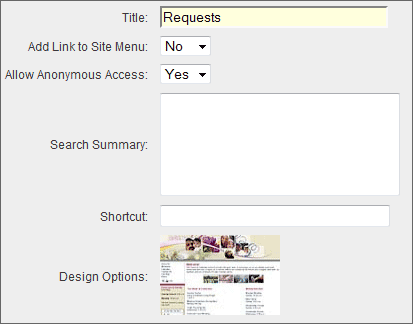
- TITLE: Enter a title for your Requests manager section. This title will appear on your main menu should you choose to display the link.
- ADD LINK TO SITE MENU: Select "Yes" from the drop down menu to display the link on your menu. Select "No" from the drop down menu to not display the link on your menu.
- ALLOW ANONYMOUS ACCESS: Select "Yes" from the drop down menu to display the link on your menu to all visitors to your site. Select "No" from the drop down menu to display the link to only those with site-wide Member access.
- SEARCH SUMMARY: Enter descriptive information to be used for Search Engine data and Site Search data.
- SHORTCUT: This allows you to make a shortcut to your Requests page. It will be a one word entry (i.e. requests). It can be accessed on the Web by typing in www.yourdomainname/shortcutname. (For example: www.yourdomain.com/requests).
- DESIGN OPTIONS: Click the design option that is currently shown. A window will appear with the other designs you made available in the Additional Designs section of the Designs manager. Select the design you want to apply to this page.
- Click the Save
 icon in the upper right corner of your screen to save your Requests manager settings. icon in the upper right corner of your screen to save your Requests manager settings.
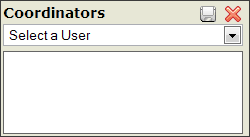 This feature is only applicable to those who have the People manager. This feature is only applicable to those who have the People manager.- Select an appropriate person from the drop down menu. The list of names that appear is populated from your People manager. The person must have an email address entered in your People manager in order to appear.
- Click the Save
 icon within the dialog box. icon within the dialog box.
- Repeat steps 2 and 3 for each Coordinator you want to add.
- To delete a Coordinator, click the Delete
 icon to the left of the person's name. icon to the left of the person's name.
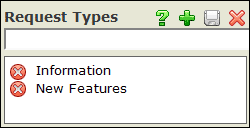 Set the types of Requests users have to choose from by typing these in the Request Type input box. For example, Information, New Features or Illness. Note: You must create a Request Type before Requests may be submitted. Set the types of Requests users have to choose from by typing these in the Request Type input box. For example, Information, New Features or Illness. Note: You must create a Request Type before Requests may be submitted.- Click the Save
 icon within the dialog box. icon within the dialog box.
- To edit a Request Type, choose the Request Type name, update its name, and click the Save
 icon within the dialog box. icon within the dialog box.
- To delete a Request Type, choose the Delete
 icon to the left of its name. icon to the left of its name.
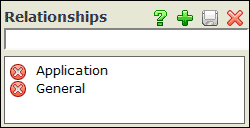 Set the types of relationships people have to choose from by typing these in the Relationship input box. For example, Application, General, Family or Friend. Note: You must create a Relationship before Requests may be submitted. Set the types of relationships people have to choose from by typing these in the Relationship input box. For example, Application, General, Family or Friend. Note: You must create a Relationship before Requests may be submitted.- Click Save
 icon within the dialog box. icon within the dialog box.
- To edit a Relationship, choose the Relationship, update its name, and click the Save
 icon within the dialog box. icon within the dialog box.
- To delete a Relationship, choose the Delete
 icon to the left of its name. icon to the left of its name.
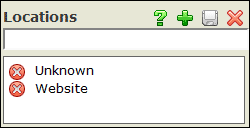 Set the Location people have to choose from by typing these into the Locations input box. For example, Website, Unknown or Hospital. Note: You must create a Location before Requests may be submitted. Set the Location people have to choose from by typing these into the Locations input box. For example, Website, Unknown or Hospital. Note: You must create a Location before Requests may be submitted.- Click the Save
 icon within the dialog box after each entry. icon within the dialog box after each entry.
- To edit a Location, choose the Location, change its name, and click the Save
 icon within the dialog box. icon within the dialog box.
- To delete a Location, choose the Delete
 icon to the left of its title. icon to the left of its title.
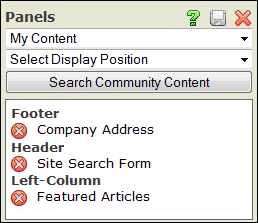 Add/Delete Panels Add/Delete Panels
- Click the Panels tab.
- Using the first drop down menu, select the panel you wish to display.
- The panel you select will appear in the preview window at the bottom of the Panels dialog box.
- Using the second drop down menu, select the display position for the area you want the panel to appear on your site.
- Click the Save
 icon within the dialog box. Repeat this process for each panel you wish to add. icon within the dialog box. Repeat this process for each panel you wish to add.
- To delete a panel placement, click the Delete
 icon to the left of the panel title. icon to the left of the panel title.
Update Panel Position and Order
- Click the Panel Name
- Using the first drop down menu, select the display position for the area you want the panel to appear on your site.
- Using the second drop down menu, select the order in which you want the panel to display. By selecting "1", the panel will appear first within its assigned position. By selecting "2", the panel will appear second within its assigned position.
- Click the Save
 icon within the dialog box. Repeat this process for each panel you wish to update. icon within the dialog box. Repeat this process for each panel you wish to update.
Search Community Content
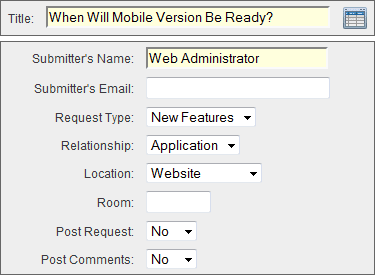
- TITLE: Enter the Request. (required)
- SUBMITTER'S NAME: Enter the name of the person submitting the Request. (required)
- SUBMITTER'S EMAIL: Enter the the email address of the person submitting the Request.
- REQUEST TYPE: Choose the Request Type from the drop down menu. If the type is not here, see Request Types above. You must set up a Request Type before a Request may be added. (required)
- RELATIONSHIP: Choose the type of relationship to the person making the Request from the drop down menu (required). If the relationship is not listed, see Relationships above.
- LOCATION: Choose the location from the drop down menu (required). If the location is not listed, see Locations above.
- ROOM: Input room number, if applicable.
- POST REQUEST: If the Request is to be posted to the web site, click yes. If it is for administrative viewing only, click no.
- POST COMMENTS: If the Request comments should be posted to the web site, select "yes". If the Request comments are for administrative viewing only, select "no".
- Click the page Save
 icon in the upper right corner of the screen when finished. icon in the upper right corner of the screen when finished.
- Whenever a Request is submitted, an e-mail is sent to the administrator saying a request has been made. It is the administrator's responsibility to check the e-mail and see if the Request needs can be posted or not.
- If the Request is to be posted, then the administrator must change the post drop down box to Yes. It is automatically set to No.
- Click the page Save
 icon in the right corner of the screen. icon in the right corner of the screen.
Note: For security purposes, the location information related to the Requests will not appear on the web site for the public at large.
- Delete a Request or Requests by selecting the check box to the left of the Request ID number.
- Click the Delete Selected
 icon. Once a Request is deleted, there is not a way to retrieve the Request. icon. Once a Request is deleted, there is not a way to retrieve the Request.
- Alternatively, you may click the Delete
 icon within the Request itself. icon within the Request itself.
To print a listing of your Requests, click the Print Requests button located just below the Manager Settings tab.
|
|


 This feature is only applicable to those who have the
This feature is only applicable to those who have the  Set the types of Requests users have to choose from by typing these in the Request Type input box. For example, Information, New Features or Illness. Note: You must create a Request Type before Requests may be submitted.
Set the types of Requests users have to choose from by typing these in the Request Type input box. For example, Information, New Features or Illness. Note: You must create a Request Type before Requests may be submitted. Set the types of relationships people have to choose from by typing these in the Relationship input box. For example, Application, General, Family or Friend. Note: You must create a Relationship before Requests may be submitted.
Set the types of relationships people have to choose from by typing these in the Relationship input box. For example, Application, General, Family or Friend. Note: You must create a Relationship before Requests may be submitted. Set the Location people have to choose from by typing these into the Locations input box. For example, Website, Unknown or Hospital. Note: You must create a Location before Requests may be submitted.
Set the Location people have to choose from by typing these into the Locations input box. For example, Website, Unknown or Hospital. Note: You must create a Location before Requests may be submitted. Add/Delete Panels
Add/Delete Panels